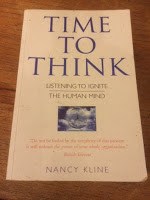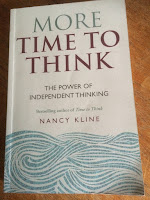 I have blogged before about Nancy Kline's book, Time to Think, and its underlying philosophy. As I made clear in that post, I am enthused about her approach, so I have booked on to her Thinking Partnership workshop, which I am attending next week (with Nancy, not one of the other licensed providers). I will report back in due course...
I have blogged before about Nancy Kline's book, Time to Think, and its underlying philosophy. As I made clear in that post, I am enthused about her approach, so I have booked on to her Thinking Partnership workshop, which I am attending next week (with Nancy, not one of the other licensed providers). I will report back in due course...In the meantime, I have been reading her sequel, More Time to Think. This expands on, and to some extent updates, the previous work; and in particular has a good section on coaching, including some suggestions for the initial exploratory meeting with a new coaching client.
I was particularly interested in this as I had already identified, through conversations in supervision, that I wished to improve my initial meetings. Kline's approach is simple, as one might expect, but also profound, as one also might expect.
She rightly points out that the two topics of conversation are what the individual wants from coaching, and how the coach coaches. I had already got that far in my previous version of the initial meeting. However, I recently conducted my first 'Kline-by-the-book' initial session, and it was very much better than my previous ones.
So what have I changed as a result of reading More Time to Think? There are a few things.
One is that I asked each question (such as 'What are your goals for this coaching?') several times. Even when I was pretty sure, and indeed the client had indicated, that he had said all he had to say, I asked it one more time; and to the surprise and delight of both of us, more good thinking flowed.
The second is that I did not take any notes. This was a bit of a wrench for me, as I mistrust my memory; but the benefits outweighed that: in particular the quality of attention I was able to give him, and the ease of the whole session for him and for me. I asked a total of nine questions (each one several times) and that part of the conversation lasted for about an hour and fifteen minutes, with him doing 95% of the talking. The results of that were much greater clarity around, and commitment to, both the overall goals of the coaching, and the milestones along the way. I also got a far deeper understanding of the client and his context.
The third is that I worked particularly hard on my listening. My listening is normally good, but I can be tempted to join in the conversation. Instead, I refused that temptation consciously, and apart from reassuring noises (yes, uh-huh, etc), two summaries and the nine questions, I kept quiet, and really focussed on what the client was saying with utmost curiosity and delight.
Oddly (or perhaps not) I find that I did not need my notes to remember the conversation (though I made notes afterwards of the key ideas).
The other big change was the way in which I described, and we discussed, my role as a coach. I have blogged before about the way I describe my work in this context. This time, I went down the route suggested by Kline, and said that my role was to help him to do his very best thinking; that he would be able to solve nearly all of his issues himself, and my job was to provide the support and stimulation for that to happen; and that I would only offer information or suggestions when we were both clear that his thinking had taken him as far as it could, and that he wanted more ideas. I talked him through the ten components of a Thinking Environment, and the underlying philosophy; and also discussed the need for feedback and honesty between us.
One more change: I got him to complete the relevant parts of the documentation: coaching goals, how we will check progress, and so on. He thought that was obviously his role (prior to this, it is something I have done after the meeting, working from my notes, and then sent back to the client to check). His observation was that it made sense for him to write the goals, both so that they were in his words, and as a practical act of commitment to them. And it saved me a job.
We ended with mutual appreciation; which again was easier than I had thought it might be, due to the quality of listening, and the subsequent degree of interest and energy, I had invested in the process.
So that feels like a successful initial session; not least modelling the fact that ownership and airtime both belong to him, and what my role is.
I will certainly be using this approach again in my initial meetings; as well as being more rigorous in my using the rest of the Kline approach in future meetings, when it is appropriate.

No comments:
Post a Comment